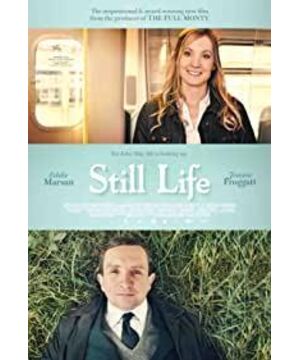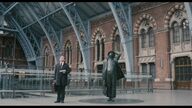When you walk into an empty house, how do you judge the identity of the occupant from the traces of life in it?
Scottish Plaid Curtains - British. Small square dining table, single chair, and plate imprints on white placemats - single. Three-piece suits - the office family. Old Briefcase - Lots of documents to deal with. The room was clean - great sense of responsibility. There is a row of classical music on the shelf - restrained and reserved. The cans in the cupboard are of the same brand - life is uneventful, set in stone. On the table was a large blue-covered album with pictures of many people, men and women, old and young, who seemed neither friends nor relatives—the only thing that was puzzling.
Sherlock Holmes' deductive method thus fails. How difficult it is to walk into a person's life.
The protagonist of "A Quiet Life", John May, is a clerk at the district office, responsible for handling the aftermath of the deceased in the community. It looks like a very boring job, and it takes twenty-two years to do it. The tone of the film is quiet, with the indifference characteristic of the British nation. The film uses a lot of fixed camera shots to emphasize May's monotonous life. The protagonist always walks the same road, and always turns the same street corner. There is always an old man on the second floor looking out the window bored. We thought he would be one of May's cases, but he was a bystander from beginning to end, witnessing May's every day.
Another point worth mentioning is the constant emergence of tabletop shots. In this way, the director lays out photos to show the lives that the dead once had. Many people's lives are properly placed in May's photo album. This is an exchange that transcends life and death. What May is looking for is family, friendship, and love. He looked for evidence that these people lived, and then reassembled the complete trajectory of his life.
This is a time of lack of compassion and lack of reverence, and even death has been objectified. And May's work is to make the lost life come alive again and return to the essence of "human". It's hard enough to live, and when you leave, you shouldn't be thrown into the incinerator like garbage. They should rest with dignity and serenity under the protection of their faith. But most people don't think so. Compared with the flippant attitude of the young corpse handler, who was immersed in crossword puzzles every day, May's way of working was too serious and rigorous. What is even more sad is that this kind of behavior of working hard for the dignity of the deceased is meaningless in the eyes of others.
The more repetitive the scene, the greater the amount of information it contains. The sight of the audience will explore the unfamiliar beyond the familiar. May slowly began to change himself. He hesitated to order hot chocolate instead of black tea. He deliberately missed a train. He lied to his boss on the phone. yearning for another way of life. The sudden dismissal order brought not anxiety but courage. Not the end, but the beginning.
May's last case runs through most of the plot. He sat in the opposite direction on the train, as if unwilling to face the coming grief and embarrassment, but when he ended the journey successfully, on the return train, he chose the forward seat. The director paid too much attention to the details, and it is these details that make the character of May plump and lovely.
There are two scenes in the film where May draws the curtains and looks out at night, and he sees his own figure reflected on the opposite windowpane. That window belonged to a dead old man, and the shot both hinted at May's loneliness and foreshadowed the inevitable ending—he exists as a projection of the dead.
"Four words, a bird that can't fly."
"Dodo."
May bought two cups with a dog pattern and walked out of the store to cross the street, not looking left or right for the first time. Close-up of the front of the car, black screen. May collapsed in a pool of blood, he blinked and smiled. At this moment, his heart was incomparably quiet and joyful, which was the satisfaction after a successful completion of an event. The dead, like DoDo, like May, should exist, but eventually become extinct.
This ending is reminiscent of the line in "The Elegance of the Hedgehog": what matters is not death, but what you are doing at the moment of death.
Mr. May, you must be ready to love.
In this impetuous era, many people despise the kind of "life that sees death at a glance", thinking that it will kill the joy of life. But no profession in this world is boring. As long as you love it and respect it, it will return the same joy to you. Even if the joy is only understood by you, it is worth it.
A farewell ceremony that no one attended, belonging to May's quiet life. The dead are not alone, and the living will eventually learn how to love.
View more about Still Life reviews











